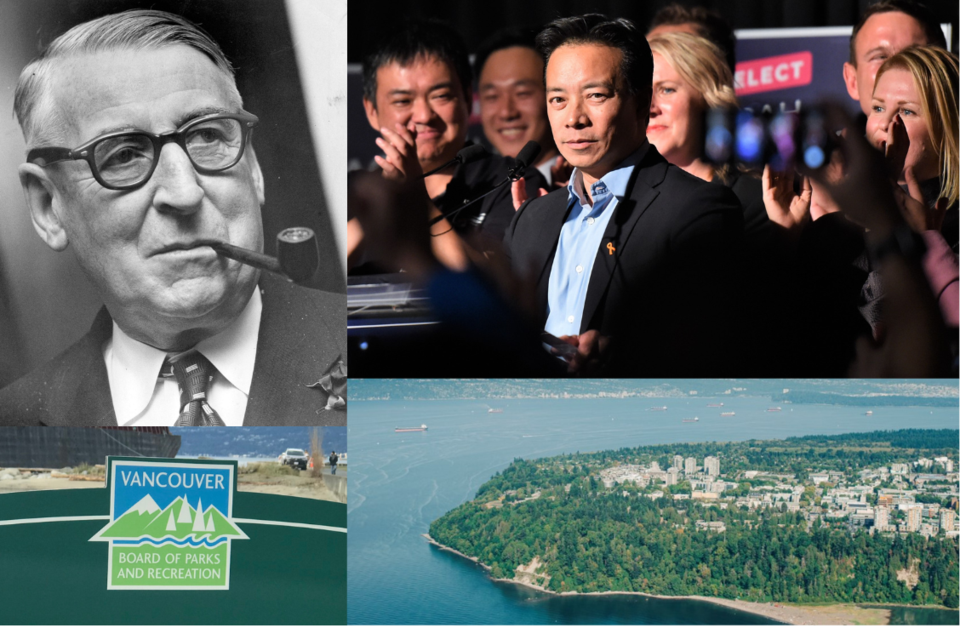Vancouver has just wrapped up another municipal election and will have its 41st mayor as Ken Sim beat incumbent Kennedy Stewart at the polls Oct. 15.
While it was a fairly straightforward campaign, Vancouver's politics aren't always the simplest for people to understand. Along with is a history, like many places, of unusual or unexpected political events.
For example, Vancouver has the Vancouver Charter, a provincial legal document that incorporates the city; what's odd about that is the fact it's the only city in B.C. to have that sort of legislation. Every other city just operates under the Local Government Act.
Here are five more things you (probably) don't know about Vancouver's politics.
1. Ken Sim is the first mayor of Vancouver who's not a white male
For those paying attention to the 2022 municipal election, it's probably no surprise to learn he's the first mayor of Chinese descent in Vancouver's history; his parents moved here in the 60s before he was born.
On top of that, though, is the fact he's the first mayor who wasn't a white guy.
No women and no person of colour have held the office to this point, which is perhaps odd to people, given Vancouver's progressive reputation and international feel. At the same time, many other B.C. cities have had mayors who weren't white men. In fact, Kamloops is believed to have had the first mayor of Chinese descent in North America—Peter Wing.
2. UBC doesn't have a municipal government
While many folks think of UBC as being in Vancouver, it's not. At least, not technically. UBC is on the University Endowment Lands (UEL), which sit outside the purview of the City of Vancouver.
On top of that, those living on UBC's lands don't vote in municipal elections because there's no municipal government there. It's an unincorporated entity; B.C. has a lot of unincorporated communities, but generally, these are rural areas without a significant population, as a municipal government is meant to deal with issues that come up in denser communities.
UBC and the UEL, with more than 3,000 residents, is not a rural community like 150 Mile House, Horsefly or Dragon Lake. In unincorporated communities the duties of local government are taken on by the regional district; in UBC's case that's Metro Vancouver.
While there's no municipal government, UBC residents can still vote in the school board election.
3. Vancouver is the only city in Canada with an elected park board
The Vancouver Board of Parks and Recreation is unique in Canada.
No other city has a board directly elected by residents to administer parks and recreation issues, which means during municipal elections Vancouverites nearly have the most people to vote for of any city in Canada if it weren't for the massive city councils in the east; Toronto has 26 members, Ottawa has 24 and Montreal has a massive 65. Even smaller cities have more, like Halifax (17) and Quebec City (22).
Back on subject, while the park board is independent of council, its budget is still under the control of the city.
4. In the 1920s proportional representation was used
Back in the early days of the city Vancouver used a ward system for a while, until the 1920s, when a new idea was tried.
Something called proportional representation.
In fact, in 1922, the mayor's race went a couple of rounds as second-place choices were counted.
However, the single transferable vote system ended by 1923.
5. One mayor worked for a dollar per year
In the 1950s Fred Hume was the mayor, holding the job from 1950 to 1958 and winning four terms (terms were shorter back then).
One of his popular moves was to forego his mayor's salary (these days it's more than $185,000), taking home just $1 per year.
Hume was an interesting fellow, as he was also Mayor of New Westminster from 1933 to 1942. He's also been inducted into the Hockey Hall of Fame for his work bringing the NHL to Vancouver.





